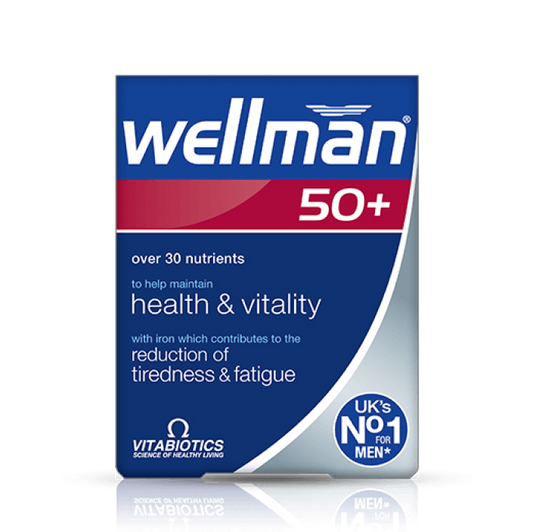Do you sometimes feel tired and lacking energy? Or maybe your skin doesn’t look radiant and your vision is sometimes blurry? The cause of these ailments may be a deficiency of vitamin B2, also known as riboflavin. This inconspicuous nutrient plays an incredibly important role in our bodies, influencing many key processes. Let’s take a closer look at this fascinating vitamin and find out why it is so important for our health.
What exactly is vitamin B2 (riboflavin)?
Vitamin B2 is one of eight compounds belonging to the vitamin B group. It is a water-soluble vitamin, which means that our body is unable to store it and we must supply it regularly with food . Its Latin name is riboflavinum. In chemical terms, riboflavin is an organic compound that is a combination of ribitol (sugar) and flavin.
In its pure form, vitamin B2 occurs as a crystalline powder with a color ranging from intense yellow to orange , characterized by a delicate smell. Its chemical formula is C₁₇H₂₀N₄O₆, and the molar mass is 376.36 g/mol. Riboflavin melts at 290 °C and is only slightly soluble in water. Interestingly, this vitamin is subject to degradation under the influence of ultraviolet radiation. This is why milk and other dairy products, which are a good source of vitamin B2, are often packed in opaque packaging, protecting them from light.
It is also worth knowing that riboflavin is used in the food industry as a natural dye with a characteristic yellow color, marked with the symbol E101. Stability at high temperatures, but sensitivity to alkaline environments are other features of this vitamin. Cooking products containing vitamin B2 is therefore permissible, but it is worth limiting the amount of water to prevent the leaching of this valuable ingredient.
In our body, riboflavin plays a key role as a precursor of two extremely important coenzymes: flavin mononucleotide (FMN) and flavin adenine dinucleotide (FAD) . These coenzymes are essential for the proper course of many metabolic processes in our body. Since our body cannot produce riboflavin on its own, we must take care to supply it with our daily diet.
You might find this useful: Vitamin B3: A Key Nutrient for Your Health
How does Vitamin B2 work in your body?
Vitamin B2 is a true multi-talent, taking part in many fundamental life processes. Its role in energy metabolism is invaluable - it is crucial for the metabolism of carbohydrates, fats and proteins, enabling the release of energy from them . It also participates in the synthesis of adenosine triphosphate (ATP), the main energy carrier in the cells of our body. Riboflavin plays an important role in the Krebs cycle, a key stage of energy production, supporting the maintenance of appropriate energy levels and metabolic health.
Vitamin B2 is also essential for the proper functioning of the nervous system , contributing to the production of neurotransmitters such as dopamine. It has a huge impact on the organ of vision, enabling the transport of oxygen in the lens of the eye and reducing the risk of cataracts and supporting proper vision. It also takes part in the process of seeing at dusk.
We cannot forget about the role of vitamin B2 in maintaining the health of the skin and mucous membranes , including the mucous membranes of the respiratory and digestive tracts. It is essential for the healthy appearance of the skin and supports the healing of wounds and skin regeneration. Riboflavin also participates in the process of creating red blood platelets and contributes to the proper metabolism of iron, which is important for the function of red blood cells.
In addition, vitamin B2 is a powerful antioxidant that protects our cells from oxidative stress caused by free radicals. It is involved in the production of cortisol, a stress hormone with anti-inflammatory effects, and enhances the action of insulin, contributing to proper hormonal management.
The list of vitamin B2 functions is impressive:
- supports the immune system
- ensures proper growth in children
- regulates blood pressure, muscle contractions and heart function
- may reduce the frequency and duration of migraine attacks
- may protect against postpartum depression
- reduce the risk of developing colon cancer
- may support thyroid health
- participate in the metabolism of some drugs
- have a positive effect on cognitive functions, especially in the elderly
- help prevent or treat anemia
- have a positive effect on bone health and support liver health.
This may be useful to you: Osteocare - calcium supplements tailored to your needs
Where to look for vitamin B2 in your daily diet?
To ensure you get the right amount of vitamin B2, it is worth including a variety of foods in your diet. Both animal and plant foods are rich sources of this valuable vitamin.
Good sources of vitamin B2 include meat, especially poultry and pork, as well as offal such as liver, kidneys and heart , which are particularly rich in the vitamin. Lamb liver is one of the richest sources, while beef and pork liver also contain significant amounts. Eggs are another valuable source of vitamin B2, especially whole hard-boiled eggs, as well as egg yolks. Dairy products such as milk, yoghurt and cheeses (including feta and semi-fat cottage cheese) also provide us with riboflavin. Greek yoghurt is a particularly good choice. And let's not forget oily fish such as mackerel and salmon. Smoked salmon with skin also contains vitamin B2.
See also: Vitamin B1 and its role in the human body
Plant-based dieters can also find plenty of sources of vitamin B2. Almonds and other nuts (e.g. walnuts, hazelnuts) are good choices. Leafy greens like spinach and broccoli also contain the vitamin, with spinach being particularly rich in vitamin B2 . Go for whole grains like whole wheat bread, brown rice, oatmeal, and millet. Legumes like lentils, beans, and peas also provide vitamin B2, as do mushrooms. Spirulina (a type of algae) is another great source. Even some fruits like avocados, bananas, and strawberries contain some riboflavin.
Yeast (e.g. brewer's yeast, nutritional yeast) is a very rich source of vitamin B2 and can be used to fortify other foods. Vitamin B2 is sometimes added to fortified foods such as breakfast cereals and energy drinks.
To help you find sources of vitamin B2, the table below shows the approximate content of this vitamin in selected food products:
|
Food Source |
Approximate Vitamin B2 Content (mg/100g or serving) |
|
Lamb liver, cooked |
4.48 mg / 85 g |
|
Spirulina |
4.11mg / 112g |
|
Beef liver, cooked |
2.77mg / 81g |
|
Spinach |
2.4 mg |
|
Almonds |
0.8 mg |
|
Broccoli |
0.7 mg |
|
Whole egg, hard-boiled |
0.70mg / 136g |
|
Red salmon, smoked |
0.59mg / 108g |
|
Milk, low-fat |
0.51mg / 245g |
|
Greek yogurt, skimmed |
0.47 mg / 170 g |
|
Semi-fat cottage cheese |
0.45 mg |
|
Spinach, cooked without salt |
0.43 mg / 180 g |
|
Rennet cheese (Tilsit) |
0.42 mg |
|
Pork meat (raw ham) |
0.24 mg |
|
Beef (roast beef) |
0.22 mg |
|
Hake |
0.20 mg |
|
Drinking milk 2% fat |
0.17 mg |
Symptoms and effects of vitamin B2 deficiency
Vitamin B2 deficiency (or ariboflavinosis) can lead to a variety of symptoms that affect many systems in our body . Due to the broad spectrum of action of riboflavin, the symptoms of its deficiency can be non-specific and resemble the symptoms of other diseases.
One of the most characteristic symptoms of vitamin B2 deficiency is skin changes and problems with mucous membranes . There may be cracks in the corners of the mouth (so-called cheilitis), inflammation of the mouth and tongue (glossitis, stomatitis), as well as swelling of the mouth and throat. The skin may become scaly and oily (seborrheic dermatitis), dry, and inflammatory changes may occur around the nose and mouth. A sore throat is also a common symptom.
Riboflavin deficiency can also negatively affect hair and nails . Hair loss can occur, and nails can become brittle and split, with white spots possibly appearing.
This may be useful to you: Hairfollic - hair supplements for your strength
The eyes are another organ affected by vitamin B2 deficiency. Redness and bloodshot eyes, itching and burning, excessive tearing and a feeling of sand under the eyelids may occur. Hypersensitivity to light (photophobia) is also characteristic, and with a significant deficiency, visual acuity may deteriorate and cataracts may develop.
Vitamin B2 deficiency can also manifest itself in problems with the nervous system and a general deterioration in well-being . Often there is a feeling of tiredness and weakness, headaches and dizziness, sleep problems (insomnia), difficulties with concentration and memory, as well as irritability and mood changes. In some cases, it can even lead to depression.
Other symptoms of vitamin B2 deficiency include anemia (normochromic-normocytic anemia), digestive problems (diarrhea, sometimes fatty), reduced immunity and increased susceptibility to infections, and in children, growth retardation may occur . Hormonal disorders and pale skin may also occur.
Safety and potential side effects of vitamin B2 overdose
Excess vitamin B2 is rarely seen because it is a water-soluble vitamin and excess is effectively eliminated from the body in the urine. Overdosing on vitamin B2 from diet alone is virtually impossible.
However, taking very high doses of riboflavin, usually in the form of dietary supplements, can lead to some side effects. The most characteristic symptom is an intense yellow or orange discoloration of the urine, which is completely harmless. It is simply a sign of the excess vitamin being excreted from the body.
In some cases, gastrointestinal complaints such as nausea, vomiting, diarrhea, and abdominal pain may occur . Rarely, when very high doses of vitamin B2 are administered by injection, nausea and vomiting may occur. Other general symptoms of hypervitaminosis, such as headaches, dizziness, or circulatory disorders, are not specifically related to an excess of vitamin B2. In rare cases, skin redness or itching may occur.
How Much Vitamin B2 Do We Need Every Day? Recommended Daily Allowance for Different Groups
Vitamin B2 requirements depend on many factors, such as age, gender, lifestyle and dietary diversity. The following recommended daily intakes are generally accepted:
- Children up to 9 years of age: 0.5 to 0.9 mg, depending on age. For children aged 10-12, approximately 0.9 mg for boys and 0.8 mg for girls is recommended.
- Youth (10-18 years):
- Boys: 1 to 1.3 mg
- Girls: 1 to 1.1 mg
- Adults:
- Men: 1.3 mg (some sources say 1.1 mg or 2.4-2.8 mg)
- Women: 1.1 mg (some sources say 0.9 mg or 1.6-2.2 mg)
- Pregnant women: 1.4 mg (some sources say 1.2 mg)
- Breastfeeding women: 1.6 mg (some sources say 1.3 mg)
Increased demand for vitamin B2 may occur during periods of intensive metabolic changes. Chronic stress may also increase demand for this vitamin due to increased production of cortisol. It is worth remembering that the maximum amount of riboflavin in the recommended daily portion of dietary supplements for adults in Poland is 40 mg.
Vitamin B2 Trivia: What is worth knowing?
The name riboflavin comes from the Latin word flavus, meaning yellow, which reflects the characteristic color of this vitamin. Even a small amount of riboflavin consumed causes an intense yellow coloration of the urine. Interestingly, vitamin B2 exhibits green fluorescence under ultraviolet light (so-called black light), which can even be observed in urine after its consumption.
Summary: Vitamin B2 – a small ingredient, a big impact on your health
Vitamin B2, although needed in relatively small amounts, plays a fundamental role in maintaining our health and energy . Its role in energy metabolism, nervous system function, vision, skin health, and many other processes makes it an essential component of our daily diet . Let's remember to include a variety of vitamin B2-rich foods in our diet to enjoy well-being and vitality.
If you suspect a deficiency or have any doubts, it is worth consulting a doctor or dietician. Take care of the right level of vitamin B2 - it is an investment in your health for many years.
See also: What are the best supplements for women?









